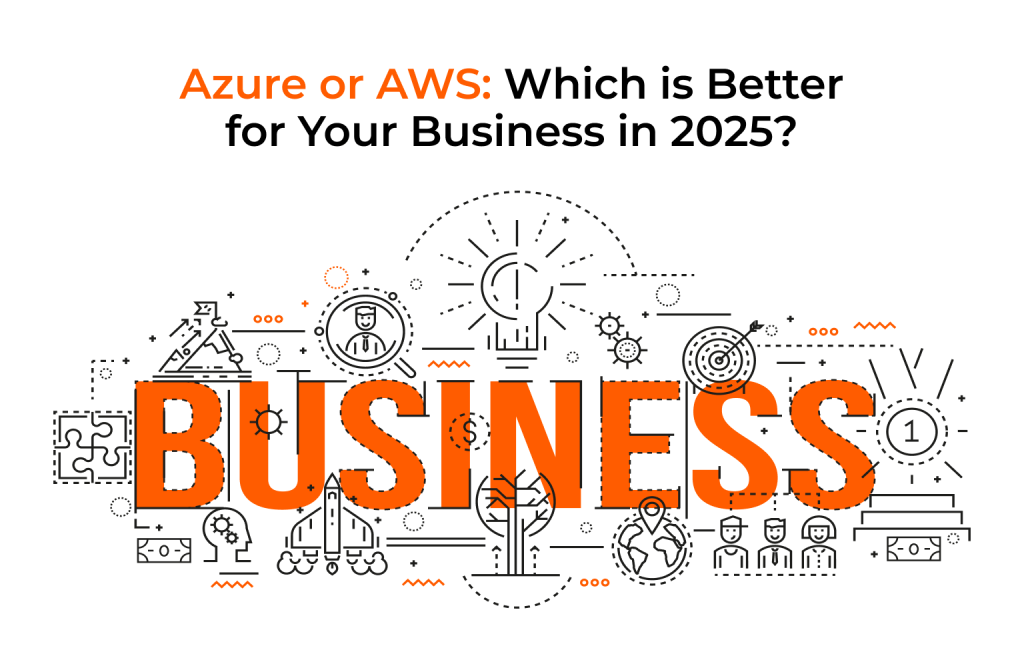Cloud technologies are now vital for businesses, providing almost unlimited computing power for various tasks. These include building digital systems, analyzing data, and using AI/ML solutions with Big Data.
As of Q2 2024, business spending on cloud infrastructure exceeded $78.2 billion. About 63% of this amount accounted for the three key leaders of the market: AWS (33%), Azure (20%), and GCP (10%). These figures highlight the Azure vs AWS rivalry and GCP’s (Google Cloud Platform) attempts to maintain its position in the segment.
This statistic alone is enough to identify the industry’s absolute favorite. However, is AWS truly the undisputed leader? Answers and a direct comparison of Azure vs AWS can be found in the following sections of this expert analysis by IT-Magic.
What is Azure?
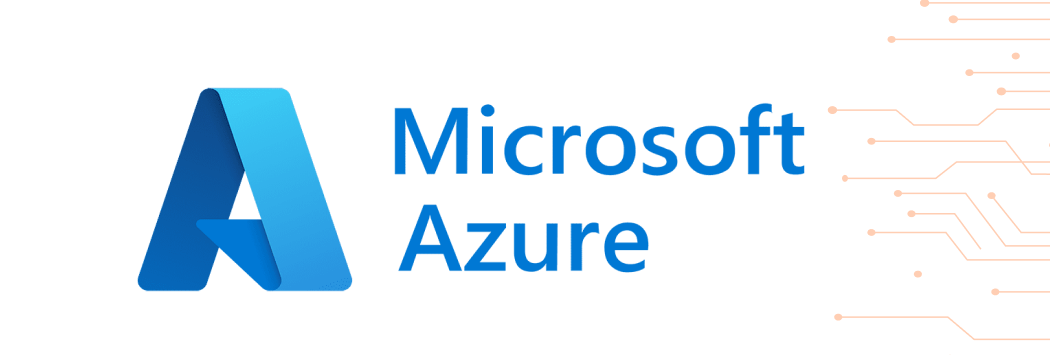
The platform was introduced in 2008, but its full release was delayed until 2010, which affected its market share. Currently, Azure ranks second in terms of profitability, prevalence, and developer interest.
The ASP infrastructure itself consists of five components:
- Windows Azure. A specialized operating system designed for quick and easy interaction with platform elements or for building infrastructure.
- Microsoft SQL. A tool for database management and for configuring data exchange between components and databases via API.
- Microsoft .NET. An SDK for building applications, tools, and managing interactions between cloud platform systems.
- Microsoft SharePoint. A set of tools for team and network collaboration for infrastructure teams and platform users.
- Microsoft Dynamics CRM. A specialized tool for managing customers, databases, and other parts of a business’s digital infrastructure.
Naturally, Azure is 100% synchronized with Office 365, Teams, and other Microsoft solutions. It also has access to Copilot and sufficient potential for working with AI/ML and other innovations.
What is AWS?

From 2002 to 2006, the platform transformed before its public release. Initially intended as a development infrastructure, it shifted in 2003 to a cloud solution for retail and more. Amazon Web Services, as we know them, launched in 2006 and quickly gained popularity.
Today, in addition to Amazon S3, SQS, and EC2, the platform offers over 200 services and continues to evolve. Notably, it now includes tools for AI/ML and Big Data, which have greatly contributed to its popularity.
Among the most well-known services are:
- Amazon EC2. A scalable cloud platform that allows for easy adjustment of computing power at any time by allocating system resources as needed.
- Amazon RDS. A relational database service with convenient management tools, APIs, and support for six key databases, including Amazon Aurora, PostgreSQL, MySQL, MariaDB, and Oracle.
- Amazon S3. A cloud storage solution for storing and protecting large volumes of data. It also offers significant scalability potential, allowing users to adjust storage sizes based on current needs.
- Amazon Lambda. An infrastructure for uploading and running code, as well as managing servers without direct administration or additional configuration.
- Amazon Cognito. A user identification and authentication system for various solutions, applications, websites, and everything managed through AWS.
Today, AWS is the top choice for building scalable and managed infrastructure for businesses of all types. Its user base, 33% market share, active community, comprehensive documentation, and full compatibility with other Amazon services and solutions make it the de facto leader in the Azure vs AWS rivalry.
But is it really that straightforward? Let’s compare and determine: Azure or AWS, which is better.
_______________________________________________________________________
Looking for a cost-effective and reliable cloud solution tailored to your needs?
Maximize your efficiency with AWS. Schedule your free consultation with our AWS experts today!
_______________________________________________________________________
Which one is better: AWS or Azure?
To determine which one is better AWS or Azure, we need to compare the platforms across several key characteristics, including:
- Market Share & Popularity.
- Core Cloud Services Comparison.
- Pricing Models.
- Performance & Reliability.
- Security & Compliance.
- Tools for Developers.
- Machine Learning & AI Capabilities.
- Hybrid Cloud Solutions.
- Support & Documentation.
By reviewing the following sections, you’ll gain a clearer understanding of is AWS better than Azure, and whether you should consider migration to AWS if you are already working with Microsoft’s platform.
Note: It’s worth considering, especially if you plan to build a large-scale infrastructure and intend to expand it over time. However, let’s first go through the key points of comparison between Azure vs AWS.
Market share & popularity
The penultimate quarter of 2024 shows an interesting dynamic in the cloud platform market.
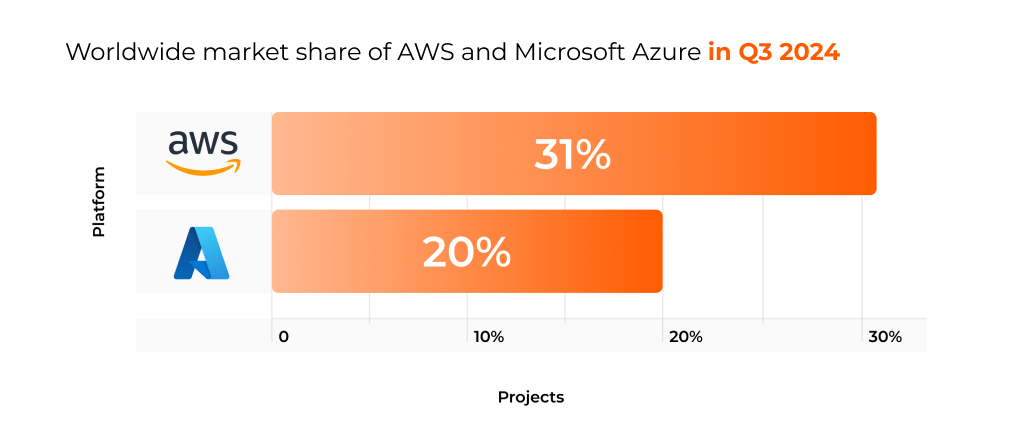
As we can see, AWS continues to hold the leading position, although with a reduced market share of 31% (2% less compared to the Q2 2024 analysis). Meanwhile, Azure’s position remains unchanged at 20%.
Accordingly, in this aspect of the AWS vs Azure comparison, there is a clear favorite. But what about other indicators?
Here too, the results are quite favorable. For instance, the number of projects on GitHub clearly demonstrates AWS’s advantage over Azure, nearly doubling the latter’s figures.
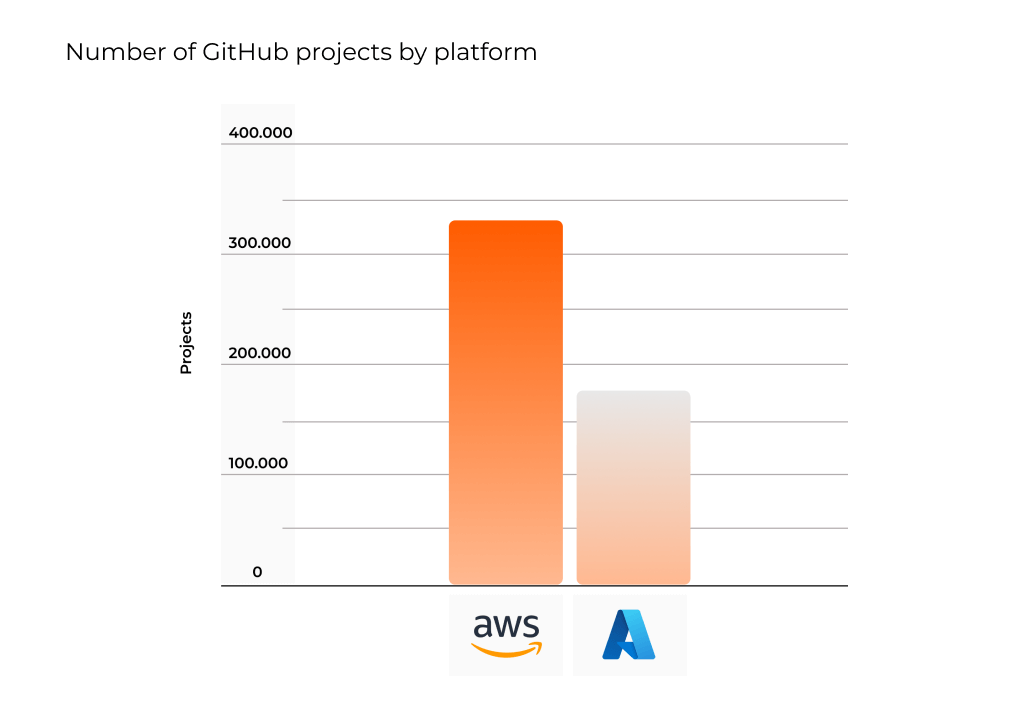
As for the use of AWS and Microsoft Azure in solution infrastructure, data from Stack Overflow clearly highlights the dominance of the first platform.
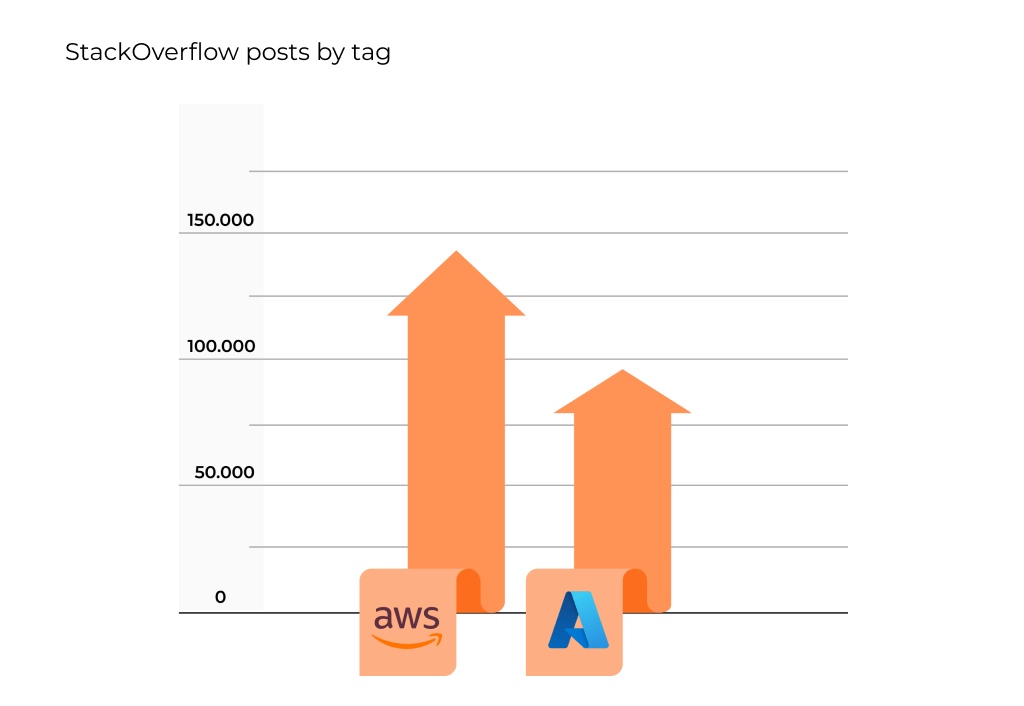
Another confirmation of AWS’s popularity and its dominance in the cloud infrastructure niche is the number of job openings on LinkedIn.
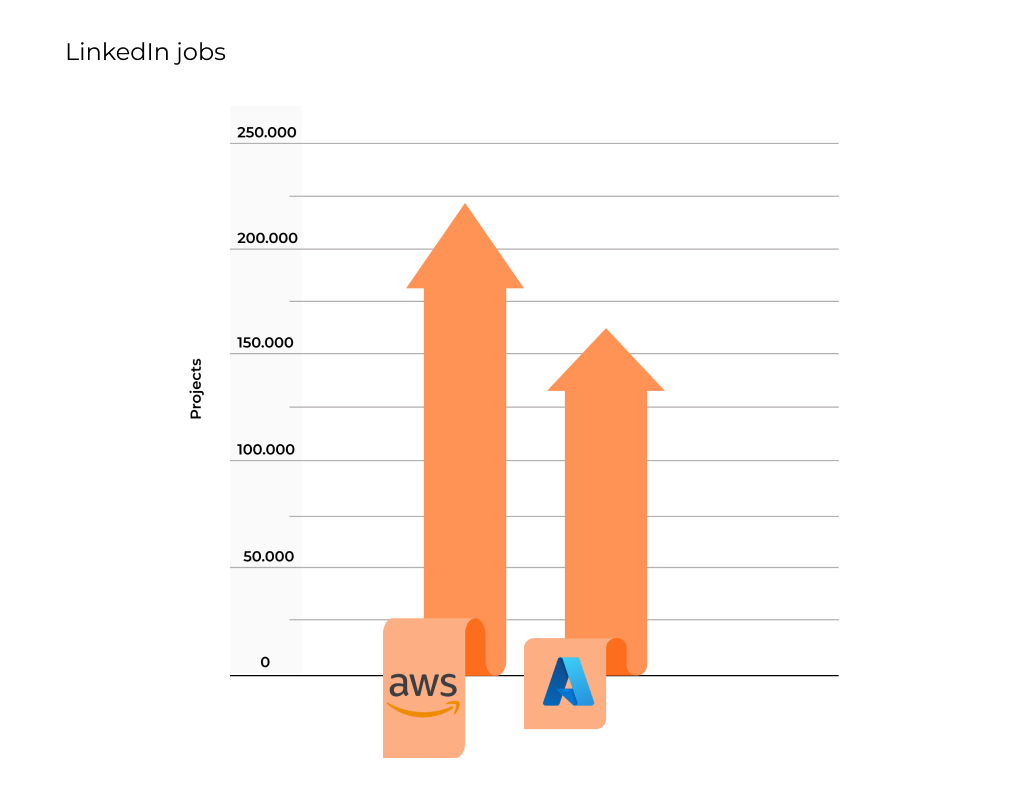
In terms of popularity, when it comes to the question “Which is better Azure or AWS?”, AWS clearly dominates. There are several reasons for this, which we will discuss further.
Core cloud services comparison
Which is best, AWS or Azure, in terms of core platform services? Well, let’s briefly compare both solutions and their core services.
| Azure Features | AWS Features |
| Azure Virtual Machines
A service for creating, deploying, and managing virtual machines. It offers a flexible system for scaling computing power and native synchronization with other Azure services. |
EC2
A cloud service for deploying infrastructure and utilizing scalable computing power. It offers a sufficient range of configurations to meet the needs of any business size or type. It has over 200 servers worldwide. |
| Azure Kubernetes Service
A service for configuring and deploying containerized, secure virtual environments for storing data or creating infrastructure components. |
AWS Lambda
A service for running code in the cloud. Its key advantage is automation, which requires no additional setup or code processing. It supports multiple key programming languages and popular frameworks. |
| Azure Blob Storage
Scalable and managed data storage in cloud environments. It can be used for working with unstructured large volumes of data, processing them, and more. |
S3
A system for storing any volume and type of data. Its feature is nearly unlimited scalability and the ability to allocate additional resources through the interface as needed, all within a few minutes. |
As you can see, the core services differ fundamentally, which complicates the choice between AWS or Azure. However, if we generalize a bit, here’s what we have in the end:
- Azure can offer a somewhat more convenient infrastructure management experience but with fewer capabilities.
- For configuring and maintaining AWS, you’ll need help from third-party experts, such as IT-Magic. However, this platform has greater potential, making it suitable for deployment even for startups.
Although there may be doubts about the latter statement due to differences in pricing policies. Therefore, let’s compare that as well in the context of AWS vs Azure: which is better.
Pricing models
Undoubtedly, pricing plays a significant role in shaping the project budget and affects the cost of supporting and maintaining digital infrastructure. However, in practice, it turns out that when comparing Azure vs AWS, there is no clear favorite.
Both platforms have similar pricing models, primarily based on the interaction time with the system, the number of connected services, and operational power. Below is a list of models for both platforms:
| Azure | AWS | |
| Free | Always free – limited access to 29 services and products. | Always free – free service with significant restrictions. |
| 12 months free – limited access to 25 platform solutions. | 12 months free – conditional test access to all services. | |
| Free trial – access to certain products and services | ||
| Basic | Pay-as-you-go – per-second pricing of each service used. | On-demand – payment only for the time services and platform tools are active. |
| Permanent | Reserved VMs – prepaid operational capacity for a specified period. | Savings Plans – relatively cheap rate with basic functionality. |
| Economical | Spot VMs – special rates with the possibility of instant capacity expansion. | Reserved Instances – option to prepay for the service at lower prices. |
| Custom | Azure Hybrid – a customized rate allowing the combination of services. | Spot Instances – instant capacity expansion and cost savings. |
When it comes to pricing, it’s difficult to evaluate Azure compared to AWS due to significant differences in hardware combinations. In fact, the cost will depend on the services used, server locations, hardware power, and even the bandwidth of communication channels.
For an accurate calculation of potential costs, it’s advisable to consult with professionals at IT-Magic, who will create a transparent estimate based on your product’s needs.
If you are a startup owner, pay attention to some bonus offers and their differences for Microsoft Azure versus AWS:

Сonclusion of the current pricing comparison: Azure can indeed be more cost-effective if you’re playing in the short term. However, AWS may become the economically beneficial infrastructure in the long run, as it offers significantly flexible pricing and discounts for customers who work with it for one to three years, or even longer.
Performance & reliability
Interestingly, when it comes to response speed and reliability, both solutions have a near parity. This is particularly due to their vast networks, which ensure maximum platform performance for clients from different geographic regions:
| AWS | 39 geographic regions.
123 availability zones. 700+ points-of-presence. |
| Azure | 60+ cloud regions.
300+ data centers globally. 192 edge locations. |
When it comes to performance, the AWS vs Azure competition also ends in a draw. Almost, since AWS offers the best flexibility and complete freedom in configuring cloud computing power and infrastructure setup. Therefore, in the hands of skilled professionals, this platform can easily outperform competitors like Azure and GCP on key metrics.
Security & compliance
Of course, you are concerned about the security of your cloud infrastructure. However, there is no need to worry, as both Azure and AWS offer equally strong protection measures and compliance standards. For example:
| Azure | AWS | |
| Tools | Azure Security Center for unified management and protection. | AWS Shield (DDoS protection), AWS WAF (web application security), encryption, IAM, and network monitoring. |
| Certifications | ISO 27001, SOC 1/2/3, HIPAA, HITRUST, FedRAMP High. | ISO 27001, SOC 1/2/3, PCI DSS. |
| Features | Microsoft Sentinel. Scalable SIEM and SOAR solution for visibility and threat response.
Microsoft Defender for Cloud. Advanced threat detection and response for workloads in hybrid cloud environments. |
Built-in network firewalls, private/dedicated connections, advanced DDoS mitigation, and automatic traffic encryption. |
When comparing Azure vs AWS, it is essential to consider the specific security needs of your project.
Tools for developers
When choosing between Azure or AWS, one of the key considerations might be the development experience on these platforms. And this is where things get interesting, as both solutions can be effective in terms of available development tools. Here are some features of each platform:
| Azure | AWS |
| Azure Artifacts – collaborative work on Maven, Gradle, npm, Python, and NuGet packages with minimal configuration of the working environment. | AWS CodeArtifact – a repository for packages, including support for tools like Maven, Gradle, npm, yarn, twine, pip (Python), and NuGet. |
| Azure Repos – version control system and centralized repository management, including package hosting. | AWS CodeBuild – a CI service that accelerates the product build process, including automated testing of packages. |
| Azure Pipelines – a tool for integrating CI/CD elements such as Git and Subversion, supporting languages like Python, Java, and C++, as well as automating build processes and package deployment. | AWS CodePipeline – an automated CI/CD service for deploying infrastructure and packages with continuous testing of new product iterations, minimizing team time investment. |
| AWS CodeDeploy – a scalable tool for automated software deployment in cloud environments. |
By the way, this comparison once again highlights the dominant position of AWS versus Azure. The list provided does not include all the tools available to teams working with these platforms. And we haven’t even mentioned the potential of AI/ML. There’s plenty to compare here.
Machine Learning & AI capabilities
It would be very strange if the two leading platforms couldn’t work with such trending technologies as ML and AI. Therefore, in this matter, the confrontation between Azure versus AWS only intensifies, as both solutions can show good results. Here are a few features of each of them:
| AWS AI/ML | Azure AI/ML |
| Amazon BedRock – a service for easy and fast scaling of AI-powered applications with the ability to dynamically invoke APIs. | Azure OpenAI Service – LLMs with deep learning methods that can work with code and process corporate data. |
| Amazon Rekognition and Panorama – a modern solution for analyzing graphical content, identifying artifacts and defects in real-time through appropriate hardware. | Azure Cognitive Search – a tool for discovering content statistics through answer generation. |
| Amazon Textract and Comprehend – a service for automated extraction and analysis of data from documents and various file formats. | Azure AI Vision – a content analyzer for graphic and video content with subsequent context identification of the materials. |
| Amazon Lex and Transcribe – a transcription and speech-to-text service with the ability for automatic real-time language translation. | Azure AI Speech & Language Capabilities – a transcription and speech synthesis tool for transforming speech into text and vice versa. |
| Amazon DevOps and CodeGuru – a set of tools for version control, code testing, and automated self-checks of programs and applications. | Azure AI Bot Service – an aggregator of virtual agents that can be easily integrated into Teams or other Microsoft products, or custom applications. |
| AWS SageMaker – a unified studio for developing LLMs, generative AI models, and analytics with extended access to all data stored in the cloud. | Azure AI Document Intelligence – a system for extracting data from corporate documentation and analyzing and organizing the information. |
Even these examples are enough to understand that in the Azure vs AWS rivalry, the latter platform offers better solutions for developers. Moreover, AWS significantly lowers the entry barrier for new specialists and facilitates the process of working with ML and AI without compromising the potential of future systems and products.
Hybrid cloud solutions
When comparing the potential and advantages of AWS vs. Azure, it is impossible not to mention the Hybrid Cloud Solutions available on both platforms. Here, there are some differences that may influence the choice of a solution that better fits the needs of your infrastructure. Some features of each system are:
| Amazon EC2 | Azure VM | |
| Configuration name | Instance types | VM series |
| Custom images | Amazon Machine Images (AMI) | VM image |
| Scalability | Auto Scaling | Virtual Machine Scale Sets |
| Hybrid Cloud support | AWS Outpost | Azure Arch |
| OS support | Linux, Windows, etc. | Linux, Windows, etc. |
| Virtual networking | Amazon Virtual Private Network (VPC) | Azure Virtual Network (VNet) |
The main difference lies in the principles of building hybrid cloud solutions. For example, AWS Outpost focuses more on expanding infrastructure and all its components across various cloud and on-premises environments. Meanwhile, Azure Arch provides centralized management of infrastructure and components, which often extend beyond the current system.
In this comparison of Azure vs AWS, it is the latter platform that offers greater flexibility and control over infrastructure, making it a universal solution.
Support & documentation
Both platforms are on par when it comes to documentation and support. Both AWS and Azure offer extensive technical documentation and localization. While these sections may have slightly different structures, they cover all aspects of working with infrastructures.
Regarding support, it is also available on both platforms and functions correctly. Moreover, active communities are also there to help resolve various issues, among other things.
Thus, there is full parity in the Azure vs AWS rivalry in this area. Summarizing everything mentioned above, we can briefly outline the advantages and disadvantages of both platforms.
Pros and cons of AWS
As for AWS, the platform has the following pros and cons:
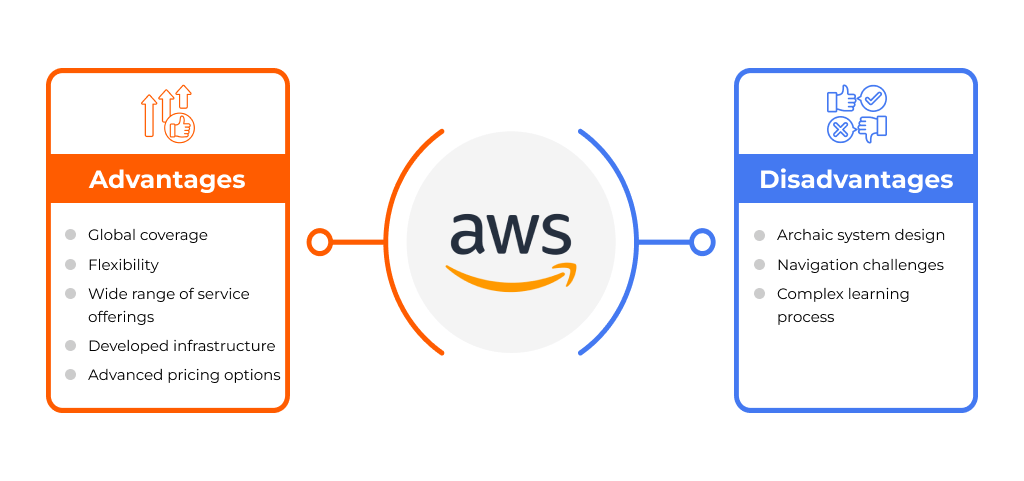
Accordingly, this system may be a better choice for long-term projects where there is a need for constant scaling and the complexity of the infrastructure based on business needs.
Pros and cons of Azure
If we consider the pros and cons of Azure, they can be characterized as follows:
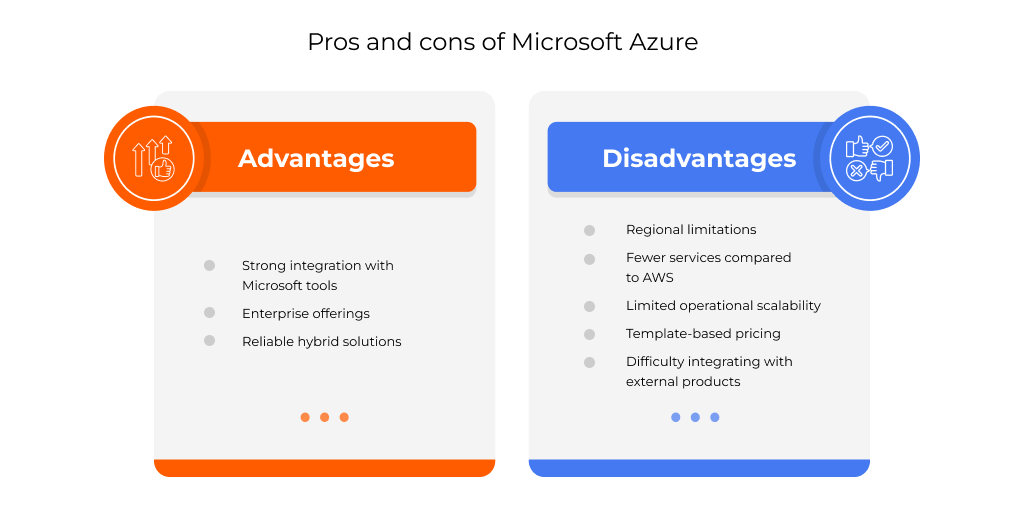
On the other hand, Azure may be easier to deploy and configure, especially if your team does not have professionals. At the same time, the platform lacks the level of flexibility that AWS offers, so it is not ideal for building highly complex infrastructures.
Conclusion: which one is better?
The comparison between Azure vs AWS can be summarized with the following statement:
- Each platform has its strengths and weaknesses and is suitable for different types of tasks in various business segments.
- For example, the Microsoft product may be better optimized for deployment in companies that use a significant number of services and solutions from the same software provider.
- On the other hand, AWS from Amazon is an almost universal platform where you can equally effectively build streaming solutions, ERP systems, products that require processing large amounts of unstructured data, and flexible database systems.
The final choice will depend on your business needs, rather than concepts or theories.
By choosing AWS as your corporate cloud platform, you gain absolute flexibility, scalability, and manageability of the system with significant potential for the future. However, keep in mind that you will need expert support, at least during the initial stages of deployment and configuration.
Therefore, if you want to unlock AWS’s potential for your business and build truly productive and convenient cloud infrastructure, take advantage of the expertise of IT-Magic. Our specialists have over a decade of experience working with the platform and will be your reliable support and partner in AWS setup, data migration, and system configuration.
Ready to start the collaboration?
Schedule your free consultation today and learn how you can use the benefits of AWS for your business.
